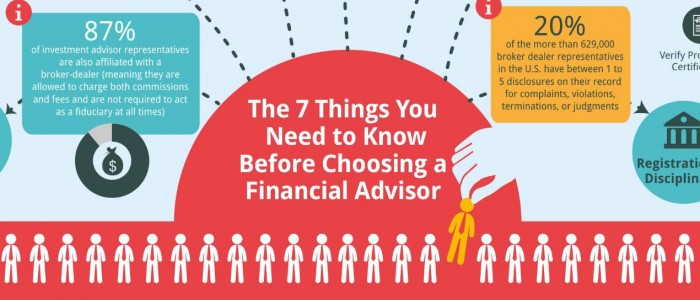When it comes to navigating the world of financial advisors, making the right choice is crucial. From understanding different types of advisors to evaluating their credentials and experience, the process can seem overwhelming. But fear not, as we dive into the intricacies of selecting the perfect financial advisor for your needs.
Let’s break down the key factors to consider, how to research potential advisors, what to ask in meetings, and ultimately, how to make that final decision with confidence.
Factors to Consider When Choosing a Financial Advisor
When it comes to choosing a financial advisor, there are several key factors you need to keep in mind to ensure you make the best decision for your financial future.
Types of Financial Advisors
- Robo-advisors: Automated platforms that provide algorithm-based financial planning.
- Registered Investment Advisors (RIAs): Fiduciaries who offer personalized financial advice.
- Broker-dealers: Financial professionals who buy and sell securities on behalf of clients.
- Insurance agents: Advisors who sell insurance products like life insurance and annuities.
Checking the Advisor’s Credentials and Certifications
It’s crucial to verify the advisor’s credentials and certifications to ensure they have the necessary qualifications to provide financial advice.
Look for designations like Certified Financial Planner (CFP) or Chartered Financial Analyst (CFA) for added credibility.
Understanding How the Advisor is Compensated
Knowing how the advisor is compensated is essential to understand any potential conflicts of interest that may arise.
Advisors can be fee-based, commission-based, or receive a combination of fees and commissions.
Considering the Advisor’s Experience and Track Record
Experience and track record are crucial factors to consider when choosing a financial advisor.
Ask about the advisor’s years in the industry, areas of expertise, and client success stories.
Researching Potential Financial Advisors

When looking for a financial advisor, it’s crucial to do your research to ensure you find the right fit for your needs. Researching potential financial advisors helps you make an informed decision and select someone you can trust with your financial future.
Online Research
- Start by searching online for financial advisors in your area.
- Visit their websites to learn more about their services, expertise, and fees.
- Check if they are registered with regulatory bodies like the SEC or FINRA.
Client Reviews and Testimonials
Reading client reviews and testimonials can provide valuable insights into the advisor’s reputation and how they work with their clients. It’s essential to pay attention to both positive and negative feedback to get a well-rounded view of their services.
Background Checks
- Conduct background checks on advisors to verify their credentials and ensure they have a clean disciplinary record.
- Look up their professional history, certifications, and any past complaints or legal issues.
- Make sure the advisor has a clean track record and operates with integrity.
Recommendations from Family and Friends
Seeking recommendations from family and friends who have worked with financial advisors can be incredibly helpful. They can provide firsthand experiences and insights into the advisor’s communication style, expertise, and overall satisfaction with their services.
Meeting with Financial Advisors
When meeting with a financial advisor for the first time, it is crucial to ask the right questions and assess their communication style, risk management approach, and ability to explain complex financial concepts. Establishing trust and feeling comfortable with your advisor is key to a successful financial partnership.
Key Questions to Ask
- What is your experience and background in financial planning?
- What is your approach to creating a financial plan tailored to my goals?
- How do you charge for your services, and what are the fees involved?
Assessing Communication Style
It is essential to evaluate how well the advisor communicates and explains financial concepts to ensure you understand your investment strategy and financial plan. A good advisor should be able to break down complex ideas into simple terms for you to grasp easily.
Evaluating Risk Management and Investment Strategies
Understanding how the advisor manages risk and develops investment strategies is crucial for aligning your financial goals and risk tolerance. Make sure the advisor’s approach aligns with your comfort level and long-term financial objectives.
Establishing Trust and Comfort
Feeling comfortable and establishing trust with your financial advisor is vital for a successful and long-term relationship. You should feel confident in their expertise, transparency, and commitment to helping you achieve your financial goals.
Making the Final Decision
When it comes to choosing a financial advisor, making the final decision requires careful consideration and evaluation of various factors. From comparing different advisors to reviewing their proposed financial plans, each step plays a crucial role in determining the best fit for your financial goals.
Checklist to Compare and Evaluate Different Financial Advisors
- Background and credentials: Verify their qualifications and certifications.
- Experience: Look into their track record and expertise in handling similar financial situations.
- Fee structure: Understand how they charge for their services and if it aligns with your budget.
- Communication: Assess their communication style and frequency of updates they provide.
Reviewing the Advisor’s Proposed Financial Plan
Before making a decision, thoroughly examine the financial plan presented by the advisor. Ensure it aligns with your financial goals, risk tolerance, and timeline. Look for clear strategies, diversification, and long-term growth potential to secure your financial future.
Understanding the Advisor’s Ongoing Services and Support
- Regular reviews: Confirm how often the advisor will review and adjust your financial plan.
- Availability: Determine how accessible the advisor is for questions or concerns.
- Additional services: Inquire about any extra services offered beyond financial planning.
Reviewing and Signing a Clear Agreement Outlining the Advisory Relationship
Make sure to carefully review the advisory agreement provided by the financial advisor. It should clearly Artikel the services offered, fees charged, responsibilities of both parties, and how the relationship will be managed.






